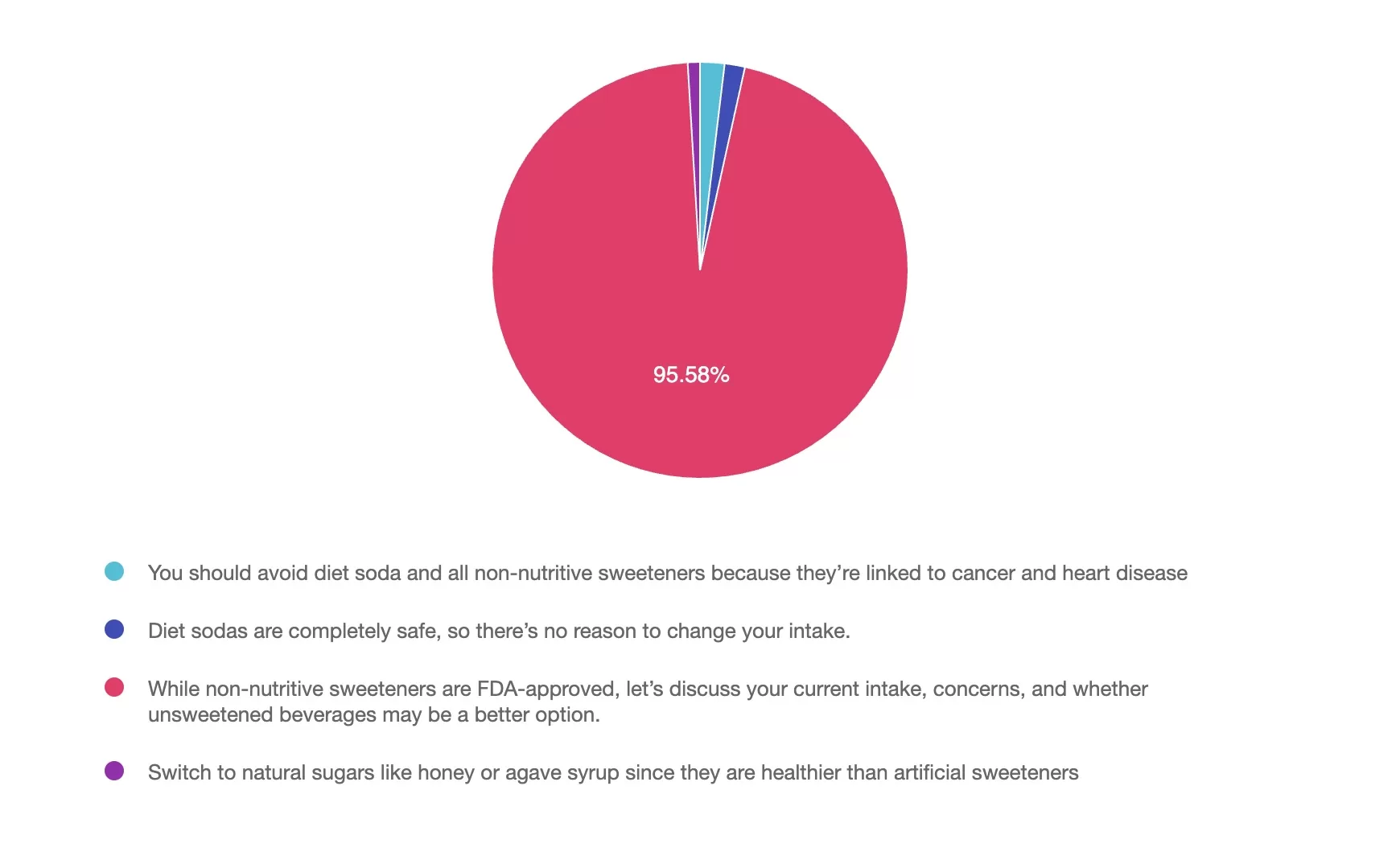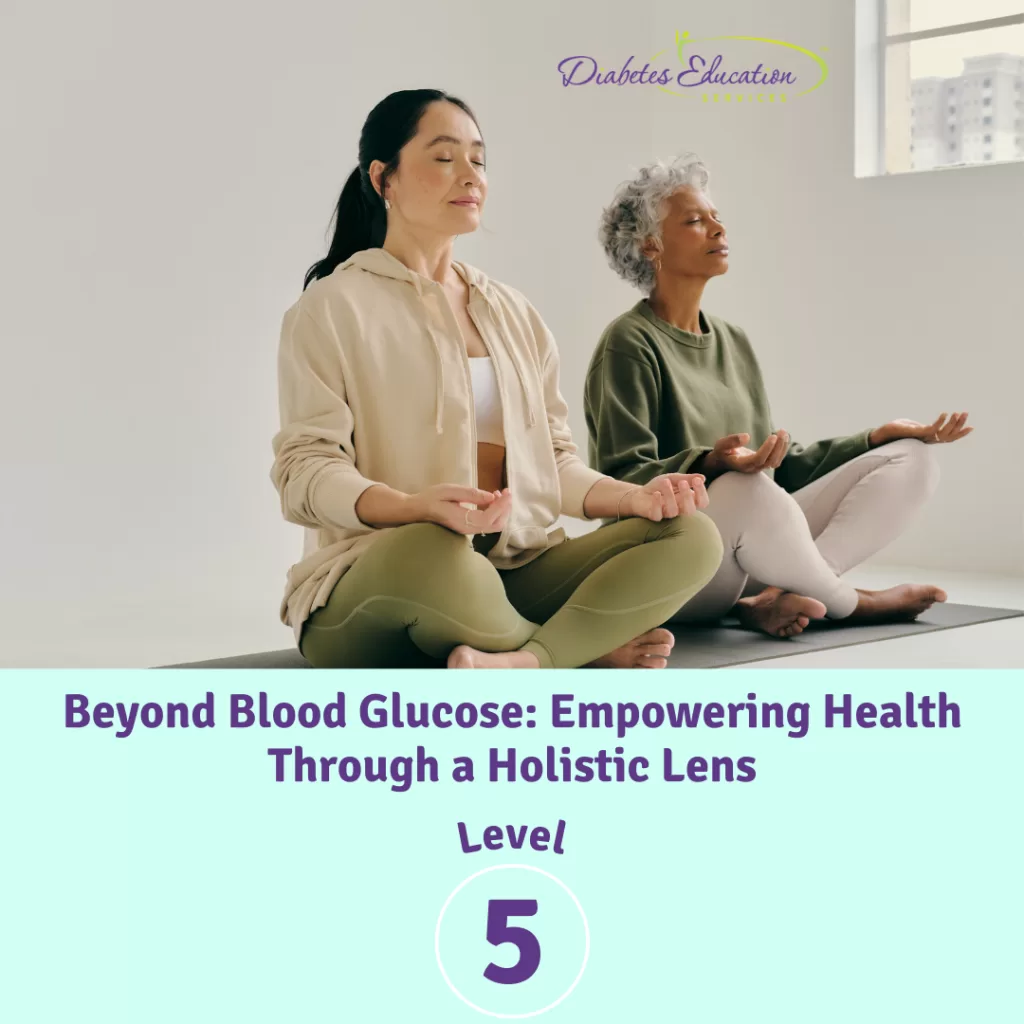For last week’s practice question, we quizzed participants on T1D and Artificial Sweeteners: Safe Limits. 95% of respondents chose the best answer. We want to clarify and share this important information, so you can pass it on to people living with diabetes and your colleagues, plus prepare for exam success!
Before we start though, if you don’t want any spoilers and haven’t tried the question yet, you can answer it below: Answer Question

Question: Sam is a 28-year-old with type 1 diabetes who reports drinking six diet sodas per day, believing they help manage blood sugar. Sam asks if this is safe or if they should reduce consumption. What would be an appropriate response based on the 2025 ADA Standards of Care?
Answer Choices:
- You should avoid diet soda and all non-nutritive sweeteners because they’re linked to cancer and heart disease.
- Diet sodas are completely safe, so there’s no reason to change your intake.
- While non-nutritive sweeteners are FDA-approved, let’s discuss your current intake, concerns, and whether unsweetened beverages may be a better option.
- Switch to natural sugars like honey or agave syrup since they are healthier than artificial sweeteners.

Getting to the Best Answer
Answer 1 is incorrect. 1% chose this answer, “You should avoid diet soda and all non-nutritive sweeteners because they’re linked to cancer and heart disease.” While concerns about non-nutritive sweeteners (NNS) exist, especially aspartame and erythritol, the ADA and FDA consider approved sweeteners safe and within acceptable daily intake levels. Blanket avoidance is not person-centered nor based on current evidence.
Answer 2 is incorrect. 1% of you chose this answer, “Diet sodas are completely safe, so there’s no reason to change your intake.” Although NNS are considered safe by the FDA, the ADA recommends moderation. It supports reducing the total intake of sweetened beverages and those with NNS, encouraging water and unsweetened options where possible.
Answer 3 is correct. About 95% of respondents chose this – GREAT JOB! “While non-nutritive sweeteners are FDA-approved, let’s discuss your current intake, concerns, and whether unsweetened beverages may be a better option.” The 2025 ADA Standards of Care support a person-centered approach and recognize that FDA-approved non-nutritive sweeteners (NNS) are safe when used in moderation. This answer allows for a discussion tailored to Sam’s health goals, type of sweetener consumed and specific concerns. While water is the preferred beverage, using NNS to replace sugar-sweetened drinks may be an option to reduce overall calorie and carbohydrate intake.
Finally, Answer 4 is incorrect. 1% chose this answer, “Switch to natural sugars like honey or agave syrup since they are healthier than artificial sweeteners.” Natural sugars like honey and agave, although considered natural, are a form of added sugar that can negatively affect blood glucose. There is no specific guidance for the amount of added sugar within the diet, but the ADA Standards of Care recommends minimizing all forms of added sugar while also considering an individual’s nutrition plan.
We hope you appreciate this week’s rationale! Thank you so much for taking the time to answer our Question of the Week and participate in this fun learning activity!
Want to learn more about holistic care from our guest expert, Nick Kundrat?
Join us live on July 24th for Beyond Blood Glucose: Empowering Health Through a Holistic Lens

Join us live on July 24th, 2025, at 11:30 am PST to watch our brand new webinar, Beyond Blood Glucose: Empowering Health Through a Holistic Lens by Nick Kundrat, BS, CEP, CDCES, LMT
Despite the rise of cutting-edge diabetes technologies and therapeutics, many people with diabetes still struggle with fatigue, blood glucose swings, and burnout. Why? Because we’re often so focused on managing diabetes itself that we often forget to take care of the human being who lives with it.
Join Nick Kundrat, BS, CEP, CDCES, LMT and Integrative Health Practitioner, for an engaging webinar where he simplifies the often-misunderstood world of holistic health. You’ll learn practical, accessible strategies to begin thinking more holistically and discover simple, effective tools that enhance conventional care and empower people with diabetes to thrive—physically, emotionally, and spiritually.
Drawing from over two decades of lived experience with type 1 diabetes and years of supporting clients in both clinical and holistic settings, Nick offers a unique perspective on diabetes care focused on the whole person. Through reconnecting with the foundational elements of health, which are often overlooked in conventional diabetes care, Nick aims to equip you with actionable strategies to help people with diabetes restore their energy, support their bodies, and thrive beyond diabetes.
All hours earned count toward your CDCES Accreditation Information
Sign up for Diabetes Blog Bytes – we post weekly Blog Bytes that are informative and FREE! Every week we post one exam practice Question of the Week and Rationale of the Week. Sign up below!
The use of DES products does not guarantee the successful passage of the certification exam. CBDCE and ADCES do not endorse any preparatory or review materials for the CDCES or BC-ADM exams, except for those published by CBDCE & ADCES.








